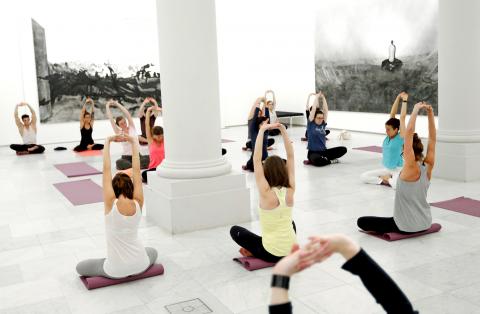Sweatworking, the growing practice of meeting clients for a walk, a run or a fitness class, is elbowing networking out of bars and restaurants and into boutique fitness studios.
A yoga, barre or spin class has become the new nine holes of golf, fitness experts said, chased by a post-workout smoothie rather than a three-martini lunch.
“Sweatworking was born out of a desire to connect with clients on a deeper level that wasn’t so sales-y,” said Sarah Siciliano, 32, an advertising executive who has been entertaining clients with workouts. “A lot of sales jobs revolve around drinking.”

Photo: Reuters
Siciliano, who is based in New York City, considers taking her mostly female clients, who range in age from 22 to 52, to yoga, spinning, bootcamp and dance studios a great tool to develop relationships.
“People like to move along with the trends,” said Siciliano, who organizes her workout events.
“I do all the leg work but I exercise everyday anyway so for me it’s a win-win,” she said. “If you can knock out a client event and your workout at the same time, why not?”
Sweatworking began in the advertising world, but has spread to more traditionally conservative professions such as law and banking, according to Alexia Brue, co-founder of the wellness media company Well+Good.
“Now a lot of client entertaining in many industries has moved into boutique studios,” she said, “especially to those with workouts that aren’t super awkward, or super-sweaty to do with a client.”
Gabby Etrog Cohen, vice president of public relations and brand strategy at SoulCycle, a national chain of 39 indoor cycling studios, said in four years sweatworking has become a regular part of her business.
“We get a mixed bag, a lot of people in financing and advertising,” said Cohen. “We have groups that come in every week. One group comes every Thursday.”
Part of the appeal, she speculates, resides in the dim studio lights.
“There’s something about not wanting to sweat in front of clients,” she said. “We ride in the dark so there’s a sense of anonymity.”
For 45 minutes and US$35 per class, the studio provides an alternative to the traditional four-hour round of golf.
Cohen said the rise of sweatworking marks the distance traveled from the chain-smoking, inebriated lifestyle of the 1960s portrayed in the hit HBO series Mad Men.
“We’ve taken Mad Men and turned it on its head,” she said.

June 9 to June 15 A photo of two men riding trendy high-wheel Penny-Farthing bicycles past a Qing Dynasty gate aptly captures the essence of Taipei in 1897 — a newly colonized city on the cusp of great change. The Japanese began making significant modifications to the cityscape in 1899, tearing down Qing-era structures, widening boulevards and installing Western-style infrastructure and buildings. The photographer, Minosuke Imamura, only spent a year in Taiwan as a cartographer for the governor-general’s office, but he left behind a treasure trove of 130 images showing life at the onset of Japanese rule, spanning July 1897 to

One of the most important gripes that Taiwanese have about the Democratic Progressive Party (DPP) is that it has failed to deliver concretely on higher wages, housing prices and other bread-and-butter issues. The parallel complaint is that the DPP cares only about glamor issues, such as removing markers of Chinese Nationalist Party (KMT) colonialism by renaming them, or what the KMT codes as “de-Sinification.” Once again, as a critical election looms, the DPP is presenting evidence for that charge. The KMT was quick to jump on the recent proposal of the Ministry of the Interior (MOI) to rename roads that symbolize

On the evening of June 1, Control Yuan Secretary-General Lee Chun-yi (李俊俋) apologized and resigned in disgrace. His crime was instructing his driver to use a Control Yuan vehicle to transport his dog to a pet grooming salon. The Control Yuan is the government branch that investigates, audits and impeaches government officials for, among other things, misuse of government funds, so his misuse of a government vehicle was highly inappropriate. If this story were told to anyone living in the golden era of swaggering gangsters, flashy nouveau riche businessmen, and corrupt “black gold” politics of the 1980s and 1990s, they would have laughed.

In an interview posted online by United Daily News (UDN) on May 26, current Chinese Nationalist Party (KMT) Chairman Eric Chu (朱立倫) was asked about Taichung Mayor Lu Shiow-yen (盧秀燕) replacing him as party chair. Though not yet officially running, by the customs of Taiwan politics, Lu has been signalling she is both running for party chair and to be the party’s 2028 presidential candidate. She told an international media outlet that she was considering a run. She also gave a speech in Keelung on national priorities and foreign affairs. For details, see the May 23 edition of this column,